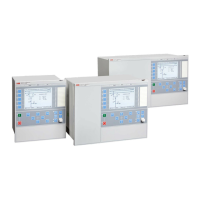BI3
BI1
QA1
BI2
QA2
QA3
BI3
BI1
QA1
BI2
QA2
QA3
BI3
BI1
QA1
BI2
QA2
QA3
BI3
BI1
QA1
BI2
QA2
QA3
BI3
BI1
QA1
BI2
QA2
QA3
ZA
ZB
IEC11000240-1-en.vsd
IEC11000240 V1 EN-US
Figure 59: Example of one-and-half circuit breaker station
All breakers are normally closed. The requirement for the busbar protection scheme is that the
scheme must have two independent differential zones, one for each busbar. In case of an
internal fault on one of the two buses, all circuit breakers associated with the faulty busbar
have to be tripped, but the supply to any load will not be interrupted. The breaker failure
protection tripping logic also needs careful design.
This type of busbar arrangement can be very easily protected. The most common setups for
this type of station are described in the following table.
Table 19: Typical solutions for one-and-half circuit breaker stations when CBF for middle breaker is not
required
Version of REB670 IED Number of diameters
in the station
Number of REB670 IEDs required for
the scheme
3PH; 2-zones, 4-bays BBP (A20) 2/4 1/2
3PH; 2-zones, 8-bays BBP (A31) 4/8 1/2
1Ph; 2-zones, 12-bays BBP (B20) 6/12 3/6
1Ph; 2-zones, 12-bays BBP (B21) 6/12 3/6
1Ph; 2-zones, 24-bays BBP (B31) 12/24 3/6
Please note that Table 19 is given for the preconfigured versions of REB670 which do not
contain any VT inputs.
A principle overall drawing of how to use REB670 for one-and-half circuit breaker station
including internal CBF protection for middle breaker is given in Figure
60.
Section 6 1MRK 505 370-UEN D
Differential protection
118 Busbar protection REB670
Application manual

